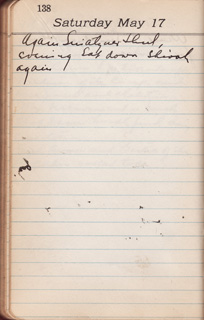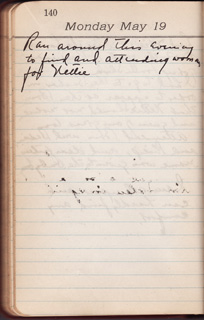 3rd day of Shiba.
3rd day of Shiba.
Memories of my beloved father travel
through my mind, oh my heart is
aching so,
This evening after prayer service [they] told
me the old Hebrew consolation
which touched me so.
In my sorrow and grief the visit
of friends offering consolation relives
my suffering a little, Among todays
visitors were Cousins Mrs. H. Breindel
Sheindel Breindel, Badiner, Lemus
and Gravitzky, Sara Alter and
Mamie from the Shop.
I shall devote myself to the worship
of God and say Kadish for the memory
of my dear father.
—————
Matt’s Notes
The “old Hebrew consolation” Papa mentions above can be written in English as hamkom yenachem etchem betoch she’ar aveilei tzion ve’yrushalaim and means “May you be consoled among the mourners of Zion and Jerusalem.” Here it is in Papa’s handwriting:

And for those not familiar, I should explain that shiva or “sitting shiva” (Papa spells it shiba in this entry; b’s and v’s are often interchangeable in Hebrew transliteration) refers to a week-long mourning period following the death of a loved one. The close family of the deceased follow a number of rituals during this week: they recite prayers, go to synagogue, and will sometimes cover their mirrors, eschew chairs for boxes, and refrain from personal grooming to deny themselves comfort and vanity.
It is also considered a good deed for friends to visit the homes of the bereaved. This explains the lists of people Papa records in his shiva entries, including a number of people we’ve met before (his cousins the Breindels and Herman Dunst, B’nai Zion brothers Lemus, Zichlinsky, and Shapiro) and some new characters (Badiner, Sara, Mamie and Pregev from work, and Aunt Golde). In keeping with tradition, Papa’s visitors would have brought food, helped out around the house and refrained from initiating unnecessary conversation in order to let him and his sisters focus fully on mourning their father, Joseph Scheurman.




 How many had heard stories about him from their parents, or had their own stories to tell of his advice, methods, and habits? How well did they know the tones of his voice, the look of his hand as he pointed at a page, the way he positioned his paralyzed arm? How many had sat beside him while he explained a difficult concept, nodded their heads, met his gaze? As Papa sat and said
How many had heard stories about him from their parents, or had their own stories to tell of his advice, methods, and habits? How well did they know the tones of his voice, the look of his hand as he pointed at a page, the way he positioned his paralyzed arm? How many had sat beside him while he explained a difficult concept, nodded their heads, met his gaze? As Papa sat and said 

